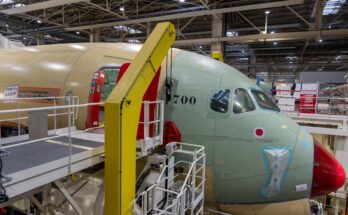by Richard Pettibone, Aerospace & Defense Companies Analyst, Forecast International.

With its restructuring a resounding success, Spirit AeroSystems is investing in growing its core operations to meet demand.
As Spirit AeroSystems’ fortunes mirror those of Boeing (which accounts for about 80 percent of its revenues), the current production ramp-ups are good news. Backlog remains high at Boeing, and the announced production rate increases on such aircraft as the 737 will only funnel more work to Spirit. In addition, Boeing’s decision to pursue the 737 MAX – in which Spirit will play a significant role – will continue to add to the backlog.
Also, Spirit AeroSystems is trying to diversify away from its Boeing-centric operations with the addition of Airbus programs to its portfolio. The company has facilities in the U.K. and France that support many Airbus programs. Most recently, Spirit’s new facility in France delivered the first Section 15 composite structure for the Airbus A350 XWB. While the firm did have difficulties in Saint-Nazaire – at one point in 2013 Airbus contemplated taking over the operation – Spirit appears to have put the operation back on track.
The company has announced plans for a $1 billion expansion at its Wichita operations to meet this growth in commercial aircraft component manufacturing. Along with this, the company plans to further expand its fabrication and defense operations. The fabrication push is a turnabout from a few years ago when the company investigated divesting the operation. Now the company has decided to catalyze its existing fabrication capability into a revenue center. The company anticipates that insourcing parts and supplying other tier-one suppliers in the aerospace and defense industry will fuel about $1 billion in revenue growth over the next five years. Further, the company’s international operations will also grow, with new capabilities in Malaysia and in Scotland.
One opportunity that may present itself in the near term is an acquisition. Rival GKN Aerospace is in the midst of a takeover battle that could see some its operations broken up. Spirit AeroSystems has been keen on increasing its Airbus content over the years and, should any of GKN’s units go on the block, the company will likely be a suitor.
Longer term, the company would like to add more defense contracting to its portfolio. Defense accounts for about 3 percent of Spirit’s annual sales, and the company would like to see the figure grow to around 20 percent. Already the firm has been identified as a supplier for Northrop Grumman’s new B-21 bomber program.
Another avenue of growth for the company is the expansion of aftermarket sales of the products it manufactures. In the past, the company collaborated with Boeing’s Aviall for distribution. Today, the company is making more sales directly via its worldwide repair stations, which have the added capability of providing full MRO services for the parts they sell.
Thanks to a strong vision from management, Spirit AeroSystems has successfully turned itself around from the troubles of five years ago. Management now has a strong strategy in place and its execution is so far moving smoothly along.
The Defense & Aerospace Companies series focuses on worldwide aerospace and defense prime contractors and subcontractors. Concise reports provide data on individual corporations regarding recent mergers, restructurings, and joint ventures, along with a Strategic Outlook that examines the company’s strengths, weaknesses, and opportunities. Also included in each report are financial and industrial segment data and snapshot coverage of major aerospace and defense programs.
A military history enthusiast, Richard began at Forecast International as editor of the World Weapons Weekly newsletter. As the Internet grew in importance as a research tool, he helped design the company's Forecast Intelligence Center and currently coordinates the EMarket Alert newsletters for clients. Richard also manages social media efforts, including two new blogs: Defense & Security Monitor, covering defense systems and international issues, and Flight Plan, which focuses on commercial aviation and space systems. For over 30 years, Richard has authored the Defense & Aerospace Companies, Volume I (North America) and Volume II (International) services. The two books provide detailed data on major aerospace and defense contractors. He also edits the International Contractors service, a database that tracks all the contractors involved in the programs covered in the FI library. More recently he was appointed Manager, Information Services Group (ISG), a new unit that encompasses developing outbound content for both Forecast International and Military Periscope.




